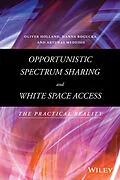Details the paradigms of opportunistic spectrum sharing and
white space access as effective means to satisfy increasing demand
for high-speed wireless communication and for novel wireless
communication applications
This book addresses opportunistic spectrum sharing and white
space access, being particularly mindful of practical
considerations and solutions. In Part I, spectrum sharing
implementation issues are considered in terms of hardware platforms
and software architectures for realization of flexible and
spectrally agile transceivers. Part II addresses practical
mechanisms supporting spectrum sharing, including spectrum sensing
for opportunistic spectrum access, machine learning and decision
making capabilities, aggregation of spectrum opportunities, and
spectrally-agile radio waveforms.
Part III presents the ongoing work on policy and regulation for
efficient and reliable spectrum sharing, including major recent
steps forward in TV White Space (TVWS) regulation and associated
geolocation database approaches, policy management aspects, and
novel licensing schemes supporting spectrum sharing. In Part IV,
business and economic aspects of spectrum sharing are considered,
including spectrum value modeling, discussion of issues around
disruptive innovation that are pertinent to opportunistic spectrum
sharing and white space access, and business benefits assessment of
the novel spectrum sharing regulatory proposal Licensed Shared
Access. Part V discusses deployments of opportunistic spectrum
sharing and white space access solutions in practice, including
work on TVWS system implementations, standardization activities,
and development and testing of systems according to the
standards.
* Discusses aspects of pioneering standards such as the IEEE
802.22 "Wi-Far" standard, the IEEE 802.11af
"White-Fi" standard, the IEEE Dynamic Spectrum Access
Networks Standards Committee standards, and the ETSI
Reconfiguration Radio Systems standards
* Investigates regulatory and regulatory-linked solutions
assisting opportunistic spectrum sharing and white space access,
including geo-location database approaches and licensing
enhancements
* Covers the pricing and value of spectrum, the economic effects
and potentials of such technologies, and provides detailed business
assessments of some particularly innovative regulatory
proposals
The flexible and efficient use of radio frequencies is necessary to
cater for the increasing data traffic demand worldwide. This book
addresses this necessity through its extensive coverage of
opportunistic spectrum sharing and white space access
solutions.
Opportunistic Spectrum Sharing and White Space Access: The
Practical Reality is a great resource for
telecommunication engineers, researchers, and students.
Autorentext
Dr. Oliver Holland is Research Fellow at the Centre
for Telecommunications Research at King's College London, United
Kingdom.
Prof. Hanna Bogucka is Professor at the Chair of Wireless
Communications at Poznan University of Technology, Poland.
Dr. Arturas Medeisis is Associate Professor and Chair
of the Telecommunications Engineering Department at Vilnius
Gediminas Technical University, Lithuania.
Zusammenfassung
Details the paradigms of opportunistic spectrum sharing and white space access as effective means to satisfy increasing demand for high-speed wireless communication and for novel wireless communication applications
This book addresses opportunistic spectrum sharing and white space access, being particularly mindful of practical considerations and solutions. In Part I, spectrum sharing implementation issues are considered in terms of hardware platforms and software architectures for realization of flexible and spectrally agile transceivers. Part II addresses practical mechanisms supporting spectrum sharing, including spectrum sensing for opportunistic spectrum access, machine learning and decision making capabilities, aggregation of spectrum opportunities, and spectrally-agile radio waveforms.
Part III presents the ongoing work on policy and regulation for efficient and reliable spectrum sharing, including major recent steps forward in TV White Space (TVWS) regulation and associated geolocation database approaches, policy management aspects, and novel licensing schemes supporting spectrum sharing. In Part IV, business and economic aspects of spectrum sharing are considered, including spectrum value modeling, discussion of issues around disruptive innovation that are pertinent to opportunistic spectrum sharing and white space access, and business benefits assessment of the novel spectrum sharing regulatory proposal Licensed Shared Access. Part V discusses deployments of opportunistic spectrum sharing and white space access solutions in practice, including work on TVWS system implementations, standardization activities, and development and testing of systems according to the standards.
- Discusses aspects of pioneering standards such as the IEEE 802.22 Wi-Far standard, the IEEE 802.11af White-Fi standard, the IEEE Dynamic Spectrum Access Networks Standards Committee standards, and the ETSI Reconfiguration Radio Systems standards
- Investigates regulatory and regulatory-linked solutions assisting opportunistic spectrum sharing and white space access, including geo-location database approaches and licensing enhancements
- Covers the pricing and value of spectrum, the economic effects and potentials of such technologies, and provides detailed business assessments of some particularly innovative regulatory proposals
Opportunistic Spectrum Sharing and White Space Access: The Practical Reality is a great resource for telecommunication engineers, researchers, and students.
Inhalt
LIST OF CONTRIBUTORS xi
INTRODUCTION xv
Oliver Holland, Hanna Bogucka, and Arturas Medeisis
ACRONYMS xxiii
PART I FLEXIBLE RADIO HARDWARE AND SOFTWARE PLATFORMS SUPPORTING SPECTRUM SHARING 1
1 The Universal Software Radio Peripheral (USRP) Family of Low-Cost SDRs 3
Matt Ettus and Martin Braun
2 On the GNU Radio Ecosystem 25
Thomas W. Rondeau
3 Wireless Open-Access Research Platform (WARP) for Flexible Radio 49
Junaid Ansari and Petri Mähönen
4 A Dynamically Reconfigurable Software Radio Framework: Iris 81
Paul Sutton
5 OpenAirInterface and ExpressMIMO2 for Spectrally Agile Communication 99
Bassem Zayen, Florian Kaltenberger, and Raymond Knopp
6 CORAL Cognitive WiFi Networking System: Case Studies of Rural Applications in India 123
John Sydor
PART II PRACTICAL MECHANISMS SUPPORTING SPECTRUM SHARING 141
7 Cooperative Sensing of Spectrum Opportunities 143
Giuseppe Caso, Luca De Nardis, Ragnar Thobaben, and Maria-Gabriella Di Benedetto
8 A Machine-Learning Approach Based on Bio-Inspired Intelligence 167
Dimitrios Karvounas, Aimilia Bantouna, Andreas Georgakopoulos, Kostas Tsagkaris, Vera Stavroulaki, and Panagiotis Demestichas
9 Spectrally Agile Waveforms 191
Alexander M. Wyglinski, Adrian Kliks, Pawel Kryszkiewicz, Amit P. Sail, and Hanna Bogucka
10 Aggregation of Spectrum Opportunities 221
Florian Kaltenberger, Theodoros A. Tsiftsis, Fotis Foukalas, Shuyu Ping, and Oliver Hol…
